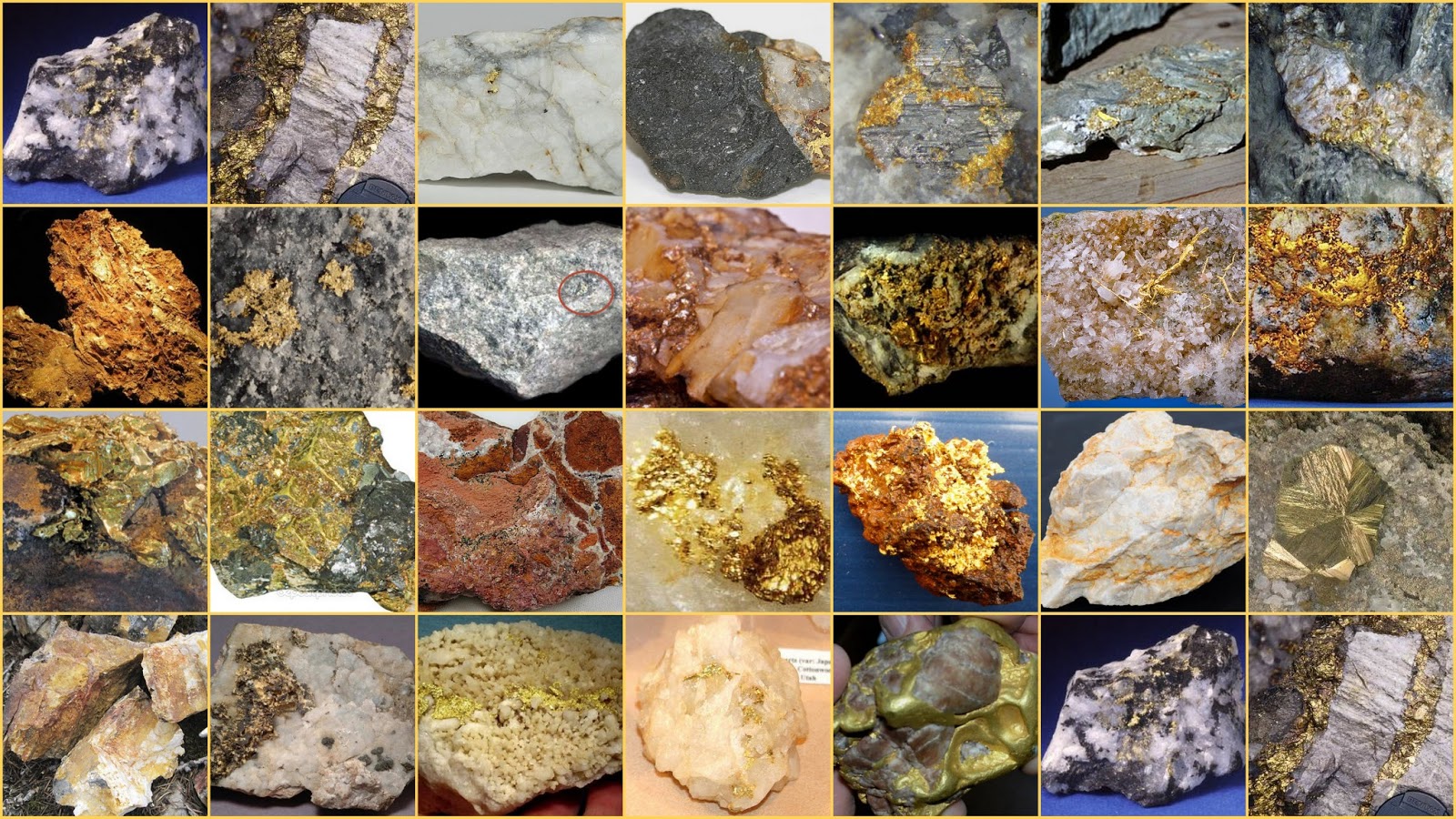Mineral resources are materials of economic interest found in or on the earth’s crust in such quality, quantity and form that can be considered for economic extraction. In Nigeria, mineral resources play a great role in the economic sector. In fact, the Nigerian economy is skewed toward the exploration of minerals. Nigeria is a blessed country with many natural resources, mineral resources and even solid resources, If any or some of this are capitalized on, we can see a shift in movement gradually for a better country. Nigeria has a rich land that is favourable to agricultural produce when well manage and there is more …
Mineral and Natural Resources in Nigeria and the States they can be found
- ABUJA
– Marble
– Clay
– Tantalite
– Cassiterite
– Gold (partially investigated)
– Lead /Zinc (Traces)
– Dolomite - ABIA STATE
– Gold
– Salt
– Limestone
– Lead/Zinc
-Crude Oil - ADAMAWA STATE
– Kaolin
– Bentonite
– Gypsum
– Magnesite - AKWA IBOM STATE
– Lead / Zinc
– Clay
– Limestone
– Uranium (Traced)
– Salt
– Lignite (Traced) - ANAMBRA STATE
– Lead/Zinck
– Clay
– Limestone
– Iron-Ore
– Lignite (Partially investigated)
– Salt
– Glass-Sand
– Phosphate
– Gypsum
-Crude Oil - BAYELSA STATE
– Clay
– Limestone
– Gypsum (partially investigated)
– Uranium (partially investigated)
– Manganese
– Lignite
– Lead/Zinc (Traces) - BAUCHI STATE
– Amethyst (violet)
– Gypsum
– Lead/Zinc (Traces)
– Uranium (partially investigated) - BENUE STATE
– Lead/Zinc
– Limestone
– Iron-Ore
– Coal
– Clay
– Marble
– Salt
– Barytes (traces)
– Gemstones
– Gypsum - BORNO STATE
– Diatomite
– Clay
– Limestone
– Hydro-carbon (oil and gas) Partially investigated) cool
– Gypsum
– Kaolin
– Bentonite - CROSS RIVER STATE
– Limestone
– Uranium
– Manganese
– Lignite
– Lead/Zinc
– Salt
-Crude Oil - DELTA STATE
– Marble
– Glass Sand
– Gypsum
– Lignite
– Iron-Ore
– Kaolin - EBONYI STATE
– Lead
– Gold shocked
– Salt - EDO STATE
– Marble
– Lignite
– Clay
– Limestone
– Iron Ore
– Gypsum
– Glass-sand
– Gold
– Dolomite Phosphate
– Bitumen
-Crude Oil - EKITI STATE
– Kaolin
– Feldspar
– Tatium
– Granite
– Syenite - ENUGU STATE
– Coal
– Limestone
– Lead/Zinc - GOMBE STATE
– Gemstone
– Gypsum - IMO STATE
– Lead/Zinc
– Limestone
– Lignite
– Phosphate
– Marcasite
– Gypsum
– Salt
-Crude Oil - JIGAWAA STATE
– Butytes - KADUNA STATE
– Sapphire
– Kaoline
– Gold
– Clay
– Serpentinite
– Asbestos
– Amethyst
– Kyanite
– Graphite (partially investigated)
– Selenite
– Mica (Traces)
– Aquamarine
– Ruby
– Rock Crystal
– Topaz
– Flopper
– Tourmaline
– Gemstone
– Tentalime - KANO STATE
– Prrochinre
– Cassiterite
– Copper
– Glass – Sand
– Gemstone
– Lead/Zinc
– Tantalite - KATSINA STATE
– Kaolin
– Marble
– Salt - KEBBI STATE
– Gold - KOGI STATE
– Iron-Ore
– Kaolin
– Gypsum
– Feldspar
– Goal
– Marble
– Dolomite
– Talc
– Tantalite - KWARA STATE
– Gold
– Marble
– Iron-Ore
– Cassiterite
– Columbite
– Tantalite
– Feldspar (Traces)
– Mica (Traces) - LAGOS STATE
– Glass-sand
– Clay
– Bitumen
– Crude Oil - NASARAWA STATE
– Beryl (Emerald)
– Aquamarine and
– Heliodor)
– Dolomite/Marble
– Sapphire
– Tourmaline
– Quartz- Amethyst (Topaz, gamet)
– Zircon
– Tantalite
– Cassiterite
– Columbite
– Lamanite
– Galena
– Iron-Ore
– Barytes
– Feldspar
– Limestone
– Mica
– Cooking coal
– Talc
– Cay
– Salt
– Chalcopyrite - OGUN STATE
– Phosphate
– Clay
– Feldspar (traces)
– Kaolin
– Limestone
– Gemstone
– Bitumen
ONDO STATE
– Bitumen
– Kaolin
– Gemstone
– Gypsum
– Feldspar
– Granite
– Clay
– Glass-sand
– Dimension stones
– Limestone
– Coal
-Crude Oil - OSUN STATE
– Gikd
– Talc
– Tourmaline
– Tourmaline
– Columbite
– Granite - OYO STATE
– Kaoline
– Marble
– Clay
– Sillimanite
– Talc
– Gold
– Cassiterite
– Aqua Marine
– Dolomite
– Gemstone
– Tantalite - PLATEAU STATE
– Emerald
– Tin
– Marble
– Granite
– Tantalite/columbite
– Lead/Zinc
– Barytes
– Iron-Ore
– Kaolin
– Belonite
– Cassiterite
– Pyrochlore
– Clay
– Coal
– Wolfram
– Salt
– Bismuth
– Fluoride
– Molybdenite
– Gemstone
– Bauxite - RIVER STATE
– Glass-sand
– Clay
– Marble
– Lignite (traces)
-Crude Oil - SOKOTO STATE
Kaolin
– Gold
= Limestone
– Phosphate
– Gypsum
– silica-sand
– Clay
– Laterite
– Potash
– Flakes
– Granite
– Gold
– Salt - TARABA STATE
– Kaolin
– Lead/Zinc - YOBE STATE
– Tintomite
– Soda Ash (partially Investigated) - ZAMFARA STATE
– Goal
– Cotton
– Gold
Major Mineral Resources in Nigeria

1. PETROLEUM/NATURAL GAS
Petroleum and Natural gas go hand in hand, this was first discovered in Oloibiri, Bayelsa state in 1959. Petroleum is by far the most important mineral available in Nigeria. About 2.5 million barrels of crude oil is produced per day while the gas reserves are put at 160 Trillion cubic meters.This large quantity of oil is produced by only 8 States known as the oil-producing States located in the Niger Delta Region of the country. These states include Akwa Ibom, Delta, Rivers, Bayelsa, Edo, Ondo, Abia and Imo. Nigeria currently has 4 refineries for refining crude oil though none can be said to be fully functional. These include 2 in Rivers state, one in Warri while the remaining one is in Kaduna state.
2. COAL
Coal was first discovered in 1909 at Enugu and exploration of it started at the Ogbete Mine in 1916. The Nigerian coal is one of the best coal in the world owning to low sulphur and ash content making it eco-friendly. From research, it had been discovered that Nigeria has nearly 3 billion tonnes of indicated coal reserves in 17 identified coal fields. Currently, only over 600 million tonnes of proven reserves are present. This mineral is very good with energy though it is not widely used in Nigeria owing to the shift to use of Diesel and gas. Internationally, countries like Italy and the United Kingdom shows interest in it. Currently, most of the mines had been deserted and the Federal Government is planning of privatisation it.
3. BITUMEN
This mineral resources was first discovered in 1900 and the exploration started in 1905. The Bitumen reserves in the Nigeria is twice the volume of the existing crude oil in the country. It is put at 42 billion tonnes. The irony of it however is, this large reserves are not been exploited and most of the bitumen used in road constructions are imported.
4. IRON ORE
Iron ore is another mineral resources in Nigeria with its largest deposit in Itakpe, Kogi state. Aside Kogi, it is also present in Enugu, Niger state and the Federal Capital Territory. About 3 billion metric tonnes of iron ore is said to be present in the country. The National Iron Ore Mining Company was founded in 1979 in order to explore and provide this iron ore to the Ajaokuta Steel Company in Ajaokuta and Delta Steel Company in Aladja. This company cannot be said to have kept to its mission and the two steel companies are even non-functional.
5. GYPSUM
The importance of gypsum cannot be overemphasised, it is used in the production of cement, plaster of Paris (POP) as well as the classroom chalk among others. About 1 billion
tonnes of gypsum deposits are spread across some states in Nigeria.
6. GOLD
Gold is one of the mineral resources in Nigeria that is exploited on a small scale. The exploration of gold is not very dominant and can be found only in States like Sokoto, Zamfara, Oyo, Niger, Kwara, Kebbi, Kaduna, Edo, Ebonyi, Bauchi and Abuja.
7. TALC
This is one of the mineral resource in Nigeria. It is found in places like Niger, Osun, Kogi, Ogun and Kaduna states. The current deposit of talc is put at around 40 million tonnes. The only talc plant in the country is the Raw Materials Research and Development Council (RMRDC)’s 3,000 tonnes per annum catalytic Talc plant in Niger state.
8. LEAD/ZINC
An estimated 10 million tonnes of lead/zinc veins are spread over Abia, Abuja, Akwa Ibom, Anambra, Bayelsa, Benue, Cross River, Ebonyi, Enugu, Kano, Niger, Plateau and Taraba. Proven reserves in 3 prospects in the east-central area are put at 5 million tonnes waiting for investors to benefit from it.
9. BENTONITE AND BARYTE
Bentonite and Baryte are the main constituents of the mud used in the drilling of all types of oil wells. Currently, over 700 million tonnes of Bentonite is spread across Adamawa, Borno and Plateau state. On the other hand, over 7.5 million tonnes of baryte have been identified in Taraba and Bauchi States.
10. GEMSTONES
Gemstones are one of the important mineral resources in Nigeria found and exploited heavily in Plateau, Kaduna and Bauchi. sapphire, ruby, aquamarine, emerald, tourmaline, topaz, garnet, amethyst; zircon, are some of the Gemstones in these areas and are regarded as part of the best in the world.
11. KAOLIN
kaolinitic clay reserves in Nigeria had been put at 3 billion tonnes and are found in places like Adamawa, Borno, Delta, Ekiti, Kaduna, Katsina, Kogi, Ogun, Ondo, Plateau and Sokoto.
12. ROCK SALT
This is a very important mineral resource in Nigeria, it is used for making caustic soda, table salt, chlorine, sodium hydrochloric acid, sodium bicarbonate and hydrogen peroxide. In fact, the annual demand for these items had exceeded 1 million tonnes. Currently, there are indications that about 1.5 million tonnes of rock salt is deposited in this country.
UnTapped Mineral Resources in Nigeria
Gold
Gold is a solid mineral that its exploration and proper finance by the government would help to revive the economy. The gold mining operation is carried out on a small-scale in Nigeria. It is found in Kwara, Bauchi, Ebonyi, Edo, Kaduna, Kebbi, Niger, Zamfara and the FCT.
Limestone
Limestone is formed through direct crystallisation from seawater and accumulation of shell fragments. The average specific gravity of Nigerian limestone varies from 2.70 to 2.86 and a possible market for the Nigerian government to explore because of its usefulness for industries. Limestone is found in large quantities in Borno, Sokoto, Cross River and Benue states.
Tin
The ability of the government to explore tin ore would amount to economic development and generate employment for Nigerians. The production of tin ore is used in paint, paper and ink industries, tin oxide resistors and electric lead wires. It is found mostly in Jos, Plateau State, with about 10,546 tonnes.
Iron ore
Iron ore deposits found in Nigeria are revealed to be the purest deposits particularly those around Itakpe in Kogi State. The Ajaokuta Steel Company (ASCL) in Ajaokuta, and Delta Steel Company (DCL) in Aladja can be revamped to explore, exploit and produce iron and steels in Nigeria. Iron ore is also discovered in Anambra, Bauchi, Benue, Delta, Edo, Kwara, Nasarawa and Plateau states. Uranium The Nigeria Uranium Mining Company (NUMCO) after it was dissolved in 1996; the government has failed to explore the resources and that has a negative effect on the economy. Uranium deposits are available in locations such as Cross River, Adamawa, Taraba, Plateau, Bauch and Kano states.
Marble
Marble is another natural resource that has the capacity to create employment for millions of Nigerians. It is common in Nigeria and mostly used for sculpture and building. It is found in the FCT, Delta, Kogi, Kwara, Oyo, Plateau, and Rivers states. Bitumen In Nigeria, bitumen was first discovered in 1900 and explored in 1905.





